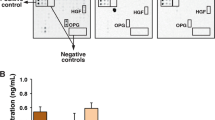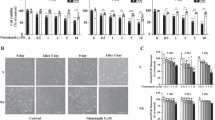Abstract
The V79/AP4 Chinese hamster fibroblasts were densely stained with the anti-basic fibroblast growth factor (bFGF) antibody demonstrating an endogenous production of the peptide. The in vitro proliferation of these cells was stimulated by exogenous bFGF and the maximum growth (259% increase in 3H-thymidine incorporation into DNA) was reached with bFGF 10 ng ml-1. Inhibition of bFGF-mediated mitogenic pathway was obtained with a 15-mer antisense oligodeoxynucleotide targeted against bFGF mRNA and with suramin, a drug which blocks the biological activity of heparin-binding growth factors. bFGF antisense oligomer reduced the synthesis of DNA by 79.5 and 89.5% at 20 and 60 microM, respectively; this effect was reversed by the addition of exogenous bFGF to the culture medium. A short-term exposure to suramin 300 micrograms ml-1 produced a modest reduction in 3H-thymidine incorporation but suppressed the mitogenic effect of bFGF on V79/AP4 cells. In cells treated with suramin 300 micrograms ml-1 the drug concentration increased linearly over 3 days, reaching 13.15 micrograms mg-1 of protein; cell proliferation was inhibited in a dose-related manner as evaluated by the colony formation assay (IC50: 344.22 micrograms ml-1) and by the number of mitoses observed in culture. Furthermore, the drug induced ultrastructural alterations, consisting of perinuclear cisternae swelling, chromatin condensation, nucleolar segregation and cytoplasmic vacuolations. These findings demonstrated that the endogenous production of bFGF plays an important role in V79/AP4 fibroblasts proliferation, and the inhibition of bFGF-mediated mitogenic signalling with bFGF antisense oligomer or suramin is an effective mean of reducing cell growth.
This is a preview of subscription content, access via your institution
Access options
Subscribe to this journal
Receive 24 print issues and online access
$259.00 per year
only $10.79 per issue
Buy this article
- Purchase on Springer Link
- Instant access to full article PDF
Prices may be subject to local taxes which are calculated during checkout
Similar content being viewed by others
Author information
Authors and Affiliations
Rights and permissions
About this article
Cite this article
Bernardini, N., Giannessi, F., Bianchi, F. et al. Involvement of basic fibroblast growth factor in suramin-induced inhibition of V79/AP4 fibroblast cell proliferation. Br J Cancer 67, 1209–1216 (1993). https://doi.org/10.1038/bjc.1993.227
Issue Date:
DOI: https://doi.org/10.1038/bjc.1993.227



